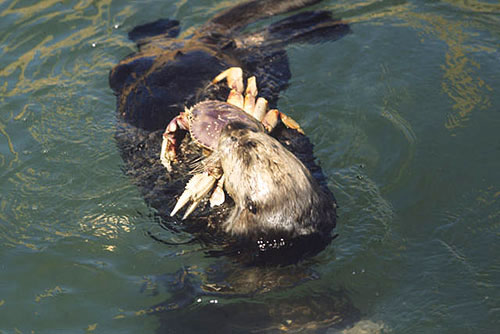
Alaska Senate Urges Management of Sea Otters to Protect ShellfishBy MARY KAUFFMAN
March 31, 2018
The resolution urges the United States Congress to amend the Marine Mammal Protection Act; urging certain federal agencies to permit Alaska Native organizations and the Alaska Department of Fish and Game to co-manage, take, and study sea otters; and urging the United States Secretary of the Interior to review evidence and waive certain provisions of the moratorium on taking sea otters. “The food locker for Southeast Alaskans is rapidly being depleted by sea otters,” said Sen. Bert Stedman (R-Sitka) the resolution’s sponsor.
Quoting a news release from Sen. Stedman, under federal management, sea otters have increased in number from zero in the early 1960s to an estimated 51,000 today. The sea otter population is growing largely unchecked by approximately 13 percent per year. Sea otters have also spread across a large area in Southeast Alaska, eating large quantities of shellfish wherever they go, and causing major negative impacts to shellfish populations. By 2030, the Alaska State Board of Fish estimates that if the federal government continues to do nothing to reduce the sea otter population, sea otters will be eating over half a billion pounds annoualy of shellfish and other foods. These same shellfish are heavily relied upon for subsistence, commercial, and recreational use by Alaskans. Federal rules under the Marine Mammal Protection Act allow hunting of sea otters by Alaska Natives, but they require hunters to have at least one-quarter Native ancestry. The resolution urges the federal government to coordinate with the State of Alaska and Tribes to take more sea otters and reduce the population. It also urges the federal government to change its blood quantum requirement to allow more Alaska Natives to participate in the hunting of sea otters. Alaska Board of Fisheries Chairman John Jensen’s support letter to Secretary of the US Department of Commerce and the Secretary of the US Department of Interior, Jensen urged federal action on sea otter management. He wrote, "The growing population of otters may continue to harm and ultimately eliminate some key fisheries that are important sources of food and livelihoods for coastal communities, subsistence harvesters, and commercial fishermen. The address this unique marine mammal recovery, the Board is in support of efforts by the US Departments of Commerce and Interior to review the MMPA [Marine Mammal Protection Act] with the intent to allow the affected communities to responsibly and sustainability manage the species and is encouraging Congress to undertake similar review." A request Jensen wrote the Alaska Board of Fisheries does not take lightly. Jensen wrote, "Many areas carefully managed for long-term sustained fisheries are now gutted with no expectation of species recovery in the foreseeable future." At the Board's Southeast meeting, Jensen wrote, commercial fishing divers reported no remaining signs of prey species in areas where sea otters are abundant. "As these commercial fisheries close, fishermen seen new areas including those near communities that are heavily used by local subsistence harvesters. These migrations create increased user conflict, often leading to addition closures for commercial harvesters.," Jensen wrote. "Loss of these fisheries will have a significant economic impact on many rural coastal communities; in 2016 alone, the value paid to commercial harvesters for key shellfish species was $18.6 million spread across 447 permits," wrote Jensen. The Organized Village of Kake, a federally recognized Tribal Government, in a resolution submitted to the Alaska Senate voiced their opposition to the Alaska State Legislature's efforts to receive a scientific permit for the purposes of sea otter population control. The Organized Village of Kake also stated in their resolution their opposition to the Alaska State Legislature's efforts to create a management plan their opposition to the Alaska Legislature's efforts to "expand the scope of allowable uses for harvest of marine mammals; require Alaska Natives to purchase a hunting license to hunt sea otter, or to Allow the Alaska Department of Fish & Game to enter a cooperative agreement to co-manage subsistence uses of marine mammals, especially the authority to permit the sale and foreign export of sea otter pelts. Lianna Jack, Executive Director of the Alaska Sea Otter and Steller Sea Lion Commission, stated in her written testimony regarding SJR 13 on March 12, 2018, the Alaska Sea Otter and Steller Sea Lion Commission Board met March 7, 2018 and SJR 13 was included on the agenda. The Board voted unanimously to strongly oppose SJR 13 and to approve TASSC Resolution 18-01, which was submitted to the Resources Committee for the record in the hearing. (The Alaska Sea Otter and Steller Sea Lion Commission Resolution 18-01 download the PDF) The Alaska Sea Otter Commission formed in December 1988 to promote Alaska Native involvement in policy decisions regarding northern sea otters. In 1998, at the request of member tribes, the Alaska Sea Otter Commission added the advocacy of Alaska Natives and Steller sea lions, and formally expanded to the Alaska Sea Otter and Steller Sea Lion Commission. Jack's written testimony stated, "We strongly oppose having the Alaska Department of Fish and Game included in any management measures for marine mammals, nor do we support having the Alaska Department of Fish and Game granted any management authority. We not believe the ADFG should be involved in developing a population management plan nor implementing such plan. We strongly oppose ADFG being granted a permit to take marine mammals to project subsistence fishery resources." SJR 13 is now on its way to the Alaska House of Representatives for consideration.
On the Web:
Source of News:
Representations of fact and opinions in comments posted are solely those of the individual posters and do not represent the opinions of Sitnews.
|
|||
